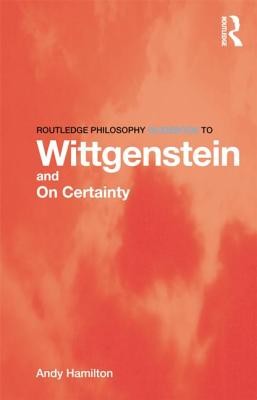
- We will send in 10–14 business days.
- Author: Andy Hamilton
- Publisher: Routledge
- ISBN-10: 0415450764
- ISBN-13: 9780415450768
- Format: 12.5 x 19.3 x 3.1 cm, minkšti viršeliai
- Language: English
- SAVE -10% with code: EXTRA
Routledge Philosophy GuideBook to Wittgenstein and On Certainty (e-book) (used book) | bookbook.eu
Reviews
Description
Ludwig Wittgenstein is arguably the most important philosopher of the twentieth century. In On Certainty he discusses central issues in epistemology, including the nature of knowledge and scepticism. The Routledge Philosophy Guidebook to Wittgenstein and On Certainty introduces and assesses:
- Wittgenstein's career and the background to his later philosophy
- the central ideas and text of On Certainty, including its responses to G.E. Moore and discussion of fundamental issues in the theory of knowledge
- Wittgenstein's continuing importance in contemporary philosophy.
This GuideBook is essential reading for all students of Wittgenstein, and for those studying epistemology and philosophy of language. On Certainty, Wittgenstein's final work, addresses a category of "world-picture" propositions discovered by G.E. Moore. These challenge Wittgenstein's enduring commitment to a well-defined category of empirical propositions, and help to generate a critique of scepticism. Developing Wittgenstein's view that scepticism is self-undermining, the Guidebook offers a combative yet therapeutic interpretation that locates On Certainty between the standpoints of Kant and Hume.
EXTRA 10 % discount with code: EXTRA
The promotion ends in 22d.13:11:03
The discount code is valid when purchasing from 10 €. Discounts do not stack.
- Author: Andy Hamilton
- Publisher: Routledge
- ISBN-10: 0415450764
- ISBN-13: 9780415450768
- Format: 12.5 x 19.3 x 3.1 cm, minkšti viršeliai
- Language: English English
Ludwig Wittgenstein is arguably the most important philosopher of the twentieth century. In On Certainty he discusses central issues in epistemology, including the nature of knowledge and scepticism. The Routledge Philosophy Guidebook to Wittgenstein and On Certainty introduces and assesses:
- Wittgenstein's career and the background to his later philosophy
- the central ideas and text of On Certainty, including its responses to G.E. Moore and discussion of fundamental issues in the theory of knowledge
- Wittgenstein's continuing importance in contemporary philosophy.
This GuideBook is essential reading for all students of Wittgenstein, and for those studying epistemology and philosophy of language. On Certainty, Wittgenstein's final work, addresses a category of "world-picture" propositions discovered by G.E. Moore. These challenge Wittgenstein's enduring commitment to a well-defined category of empirical propositions, and help to generate a critique of scepticism. Developing Wittgenstein's view that scepticism is self-undermining, the Guidebook offers a combative yet therapeutic interpretation that locates On Certainty between the standpoints of Kant and Hume.


Reviews